Effective International HR Management in Hospitality: An Analysis
VerifiedAdded on 2020/03/07
|19
|4465
|163
Essay
AI Summary
This essay critically evaluates the complexities and importance of effective international human resource management (HRM) within the hospitality industry. It emphasizes the industry's global nature, covering various business entities like hotels and restaurants, and the customer-focused approach that relies heavily on employee management. The essay explores the challenges of attracting, training, and retaining competent staff in a competitive and culturally diverse environment. It delves into key HRM practices, including performance management, HR competencies, recruitment, induction, and training, while also examining market systems, reward systems, and employment policies. Cultural factors, strategic management, and the impact of technology on HRM are also discussed. The essay highlights the importance of aligning HR practices with organizational goals to enhance brand image, employee performance, and overall business success. It also addresses the challenges of managing cross-border workers and the impact of global trends and legislation on HRM strategies.
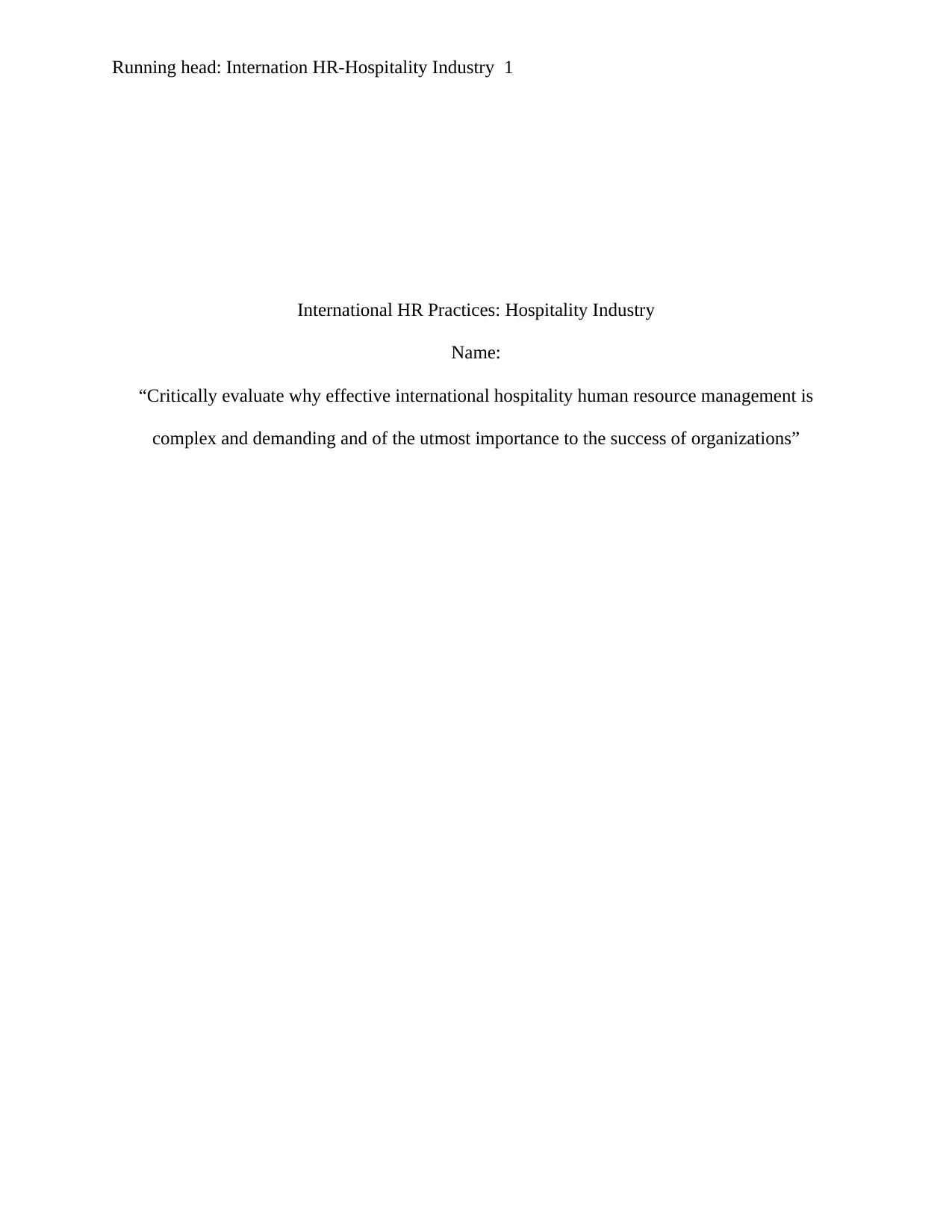
Running head: Internation HR-Hospitality Industry 1
International HR Practices: Hospitality Industry
Name:
“Critically evaluate why effective international hospitality human resource management is
complex and demanding and of the utmost importance to the success of organizations”
International HR Practices: Hospitality Industry
Name:
“Critically evaluate why effective international hospitality human resource management is
complex and demanding and of the utmost importance to the success of organizations”
Paraphrase This Document
Need a fresh take? Get an instant paraphrase of this document with our AI Paraphraser
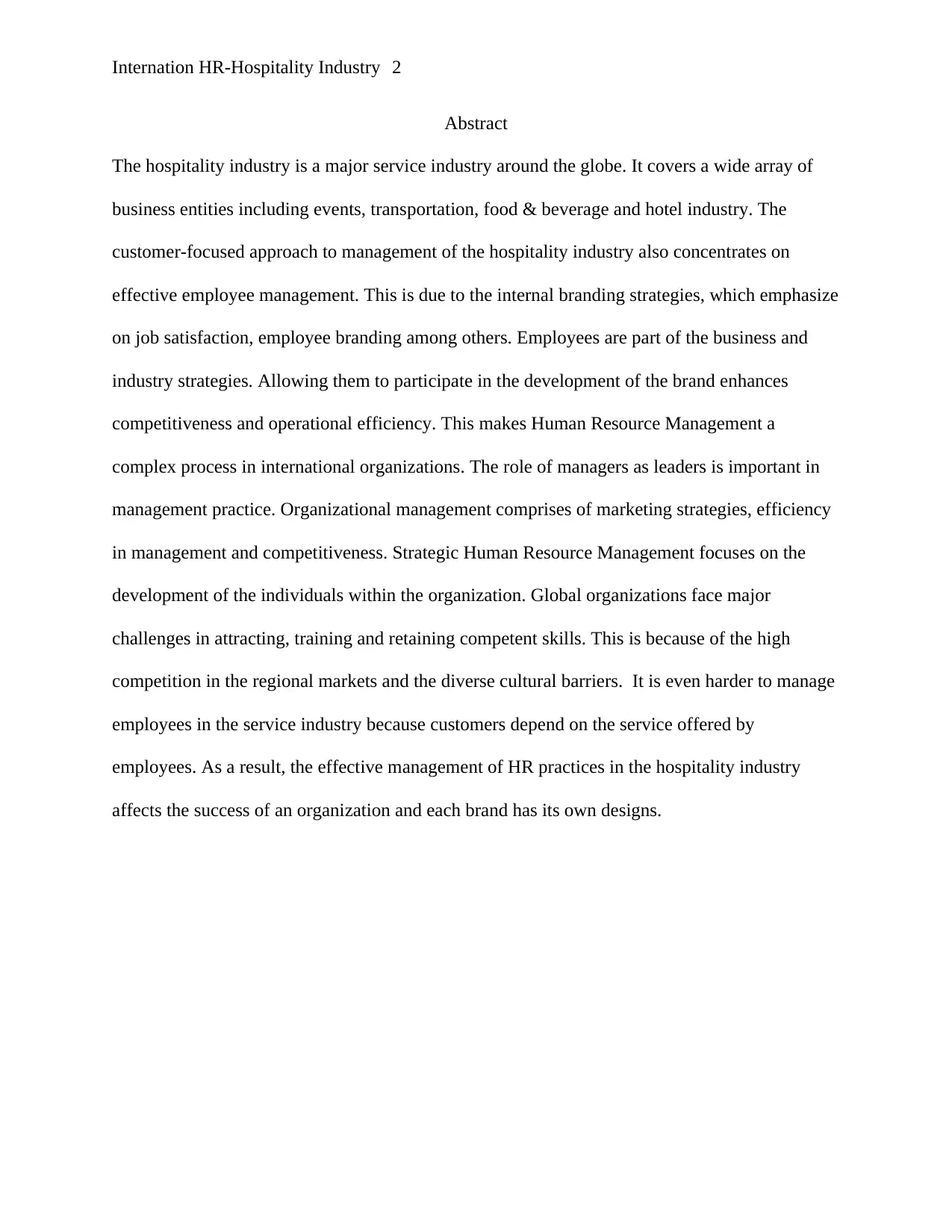
Internation HR-Hospitality Industry 2
Abstract
The hospitality industry is a major service industry around the globe. It covers a wide array of
business entities including events, transportation, food & beverage and hotel industry. The
customer-focused approach to management of the hospitality industry also concentrates on
effective employee management. This is due to the internal branding strategies, which emphasize
on job satisfaction, employee branding among others. Employees are part of the business and
industry strategies. Allowing them to participate in the development of the brand enhances
competitiveness and operational efficiency. This makes Human Resource Management a
complex process in international organizations. The role of managers as leaders is important in
management practice. Organizational management comprises of marketing strategies, efficiency
in management and competitiveness. Strategic Human Resource Management focuses on the
development of the individuals within the organization. Global organizations face major
challenges in attracting, training and retaining competent skills. This is because of the high
competition in the regional markets and the diverse cultural barriers. It is even harder to manage
employees in the service industry because customers depend on the service offered by
employees. As a result, the effective management of HR practices in the hospitality industry
affects the success of an organization and each brand has its own designs.
Abstract
The hospitality industry is a major service industry around the globe. It covers a wide array of
business entities including events, transportation, food & beverage and hotel industry. The
customer-focused approach to management of the hospitality industry also concentrates on
effective employee management. This is due to the internal branding strategies, which emphasize
on job satisfaction, employee branding among others. Employees are part of the business and
industry strategies. Allowing them to participate in the development of the brand enhances
competitiveness and operational efficiency. This makes Human Resource Management a
complex process in international organizations. The role of managers as leaders is important in
management practice. Organizational management comprises of marketing strategies, efficiency
in management and competitiveness. Strategic Human Resource Management focuses on the
development of the individuals within the organization. Global organizations face major
challenges in attracting, training and retaining competent skills. This is because of the high
competition in the regional markets and the diverse cultural barriers. It is even harder to manage
employees in the service industry because customers depend on the service offered by
employees. As a result, the effective management of HR practices in the hospitality industry
affects the success of an organization and each brand has its own designs.
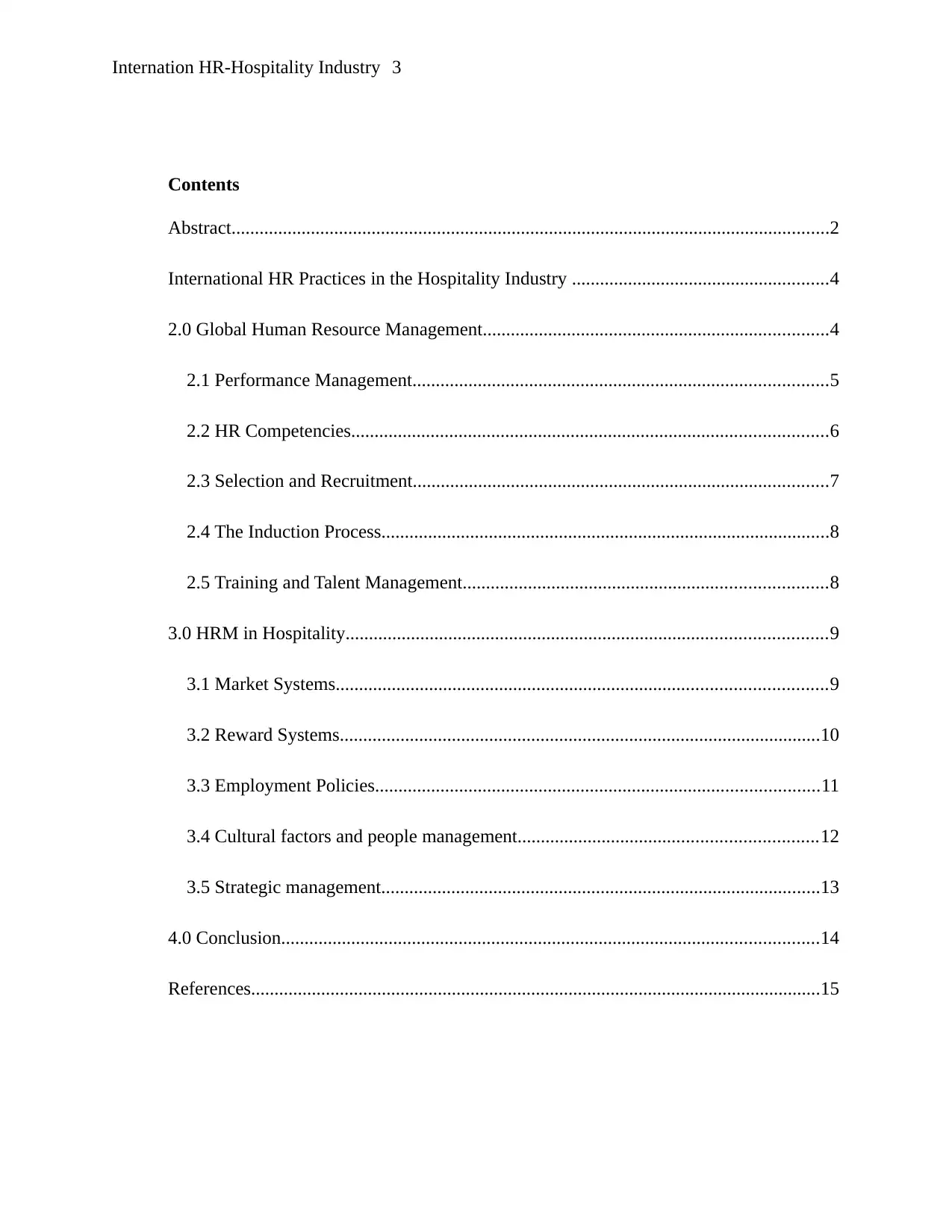
Internation HR-Hospitality Industry 3
Contents
Abstract................................................................................................................................2
International HR Practices in the Hospitality Industry .......................................................4
2.0 Global Human Resource Management..........................................................................4
2.1 Performance Management.........................................................................................5
2.2 HR Competencies......................................................................................................6
2.3 Selection and Recruitment.........................................................................................7
2.4 The Induction Process................................................................................................8
2.5 Training and Talent Management..............................................................................8
3.0 HRM in Hospitality.......................................................................................................9
3.1 Market Systems.........................................................................................................9
3.2 Reward Systems.......................................................................................................10
3.3 Employment Policies...............................................................................................11
3.4 Cultural factors and people management................................................................12
3.5 Strategic management..............................................................................................13
4.0 Conclusion...................................................................................................................14
References..........................................................................................................................15
Contents
Abstract................................................................................................................................2
International HR Practices in the Hospitality Industry .......................................................4
2.0 Global Human Resource Management..........................................................................4
2.1 Performance Management.........................................................................................5
2.2 HR Competencies......................................................................................................6
2.3 Selection and Recruitment.........................................................................................7
2.4 The Induction Process................................................................................................8
2.5 Training and Talent Management..............................................................................8
3.0 HRM in Hospitality.......................................................................................................9
3.1 Market Systems.........................................................................................................9
3.2 Reward Systems.......................................................................................................10
3.3 Employment Policies...............................................................................................11
3.4 Cultural factors and people management................................................................12
3.5 Strategic management..............................................................................................13
4.0 Conclusion...................................................................................................................14
References..........................................................................................................................15
⊘ This is a preview!⊘
Do you want full access?
Subscribe today to unlock all pages.

Trusted by 1+ million students worldwide
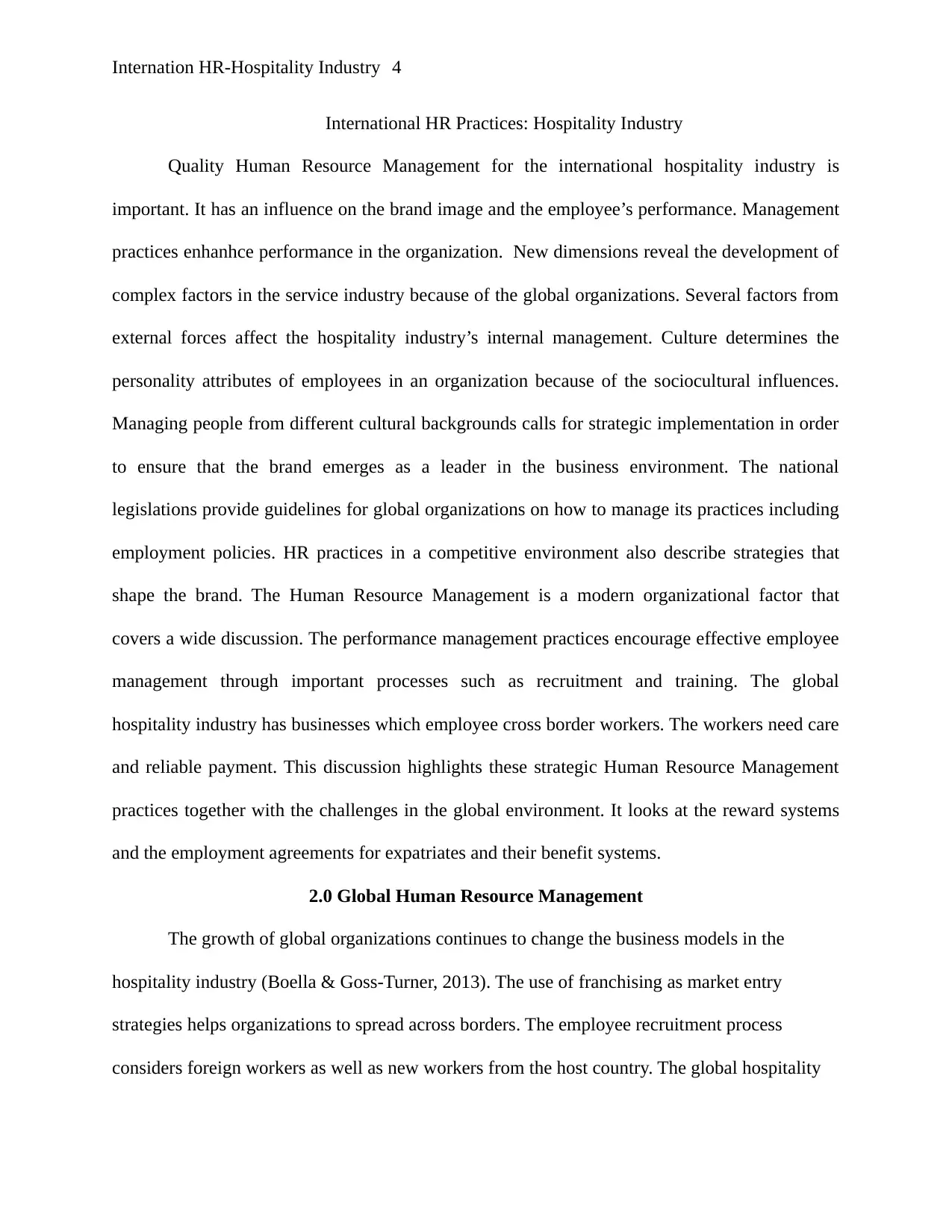
Internation HR-Hospitality Industry 4
International HR Practices: Hospitality Industry
Quality Human Resource Management for the international hospitality industry is
important. It has an influence on the brand image and the employee’s performance. Management
practices enhanhce performance in the organization. New dimensions reveal the development of
complex factors in the service industry because of the global organizations. Several factors from
external forces affect the hospitality industry’s internal management. Culture determines the
personality attributes of employees in an organization because of the sociocultural influences.
Managing people from different cultural backgrounds calls for strategic implementation in order
to ensure that the brand emerges as a leader in the business environment. The national
legislations provide guidelines for global organizations on how to manage its practices including
employment policies. HR practices in a competitive environment also describe strategies that
shape the brand. The Human Resource Management is a modern organizational factor that
covers a wide discussion. The performance management practices encourage effective employee
management through important processes such as recruitment and training. The global
hospitality industry has businesses which employee cross border workers. The workers need care
and reliable payment. This discussion highlights these strategic Human Resource Management
practices together with the challenges in the global environment. It looks at the reward systems
and the employment agreements for expatriates and their benefit systems.
2.0 Global Human Resource Management
The growth of global organizations continues to change the business models in the
hospitality industry (Boella & Goss-Turner, 2013). The use of franchising as market entry
strategies helps organizations to spread across borders. The employee recruitment process
considers foreign workers as well as new workers from the host country. The global hospitality
International HR Practices: Hospitality Industry
Quality Human Resource Management for the international hospitality industry is
important. It has an influence on the brand image and the employee’s performance. Management
practices enhanhce performance in the organization. New dimensions reveal the development of
complex factors in the service industry because of the global organizations. Several factors from
external forces affect the hospitality industry’s internal management. Culture determines the
personality attributes of employees in an organization because of the sociocultural influences.
Managing people from different cultural backgrounds calls for strategic implementation in order
to ensure that the brand emerges as a leader in the business environment. The national
legislations provide guidelines for global organizations on how to manage its practices including
employment policies. HR practices in a competitive environment also describe strategies that
shape the brand. The Human Resource Management is a modern organizational factor that
covers a wide discussion. The performance management practices encourage effective employee
management through important processes such as recruitment and training. The global
hospitality industry has businesses which employee cross border workers. The workers need care
and reliable payment. This discussion highlights these strategic Human Resource Management
practices together with the challenges in the global environment. It looks at the reward systems
and the employment agreements for expatriates and their benefit systems.
2.0 Global Human Resource Management
The growth of global organizations continues to change the business models in the
hospitality industry (Boella & Goss-Turner, 2013). The use of franchising as market entry
strategies helps organizations to spread across borders. The employee recruitment process
considers foreign workers as well as new workers from the host country. The global hospitality
Paraphrase This Document
Need a fresh take? Get an instant paraphrase of this document with our AI Paraphraser
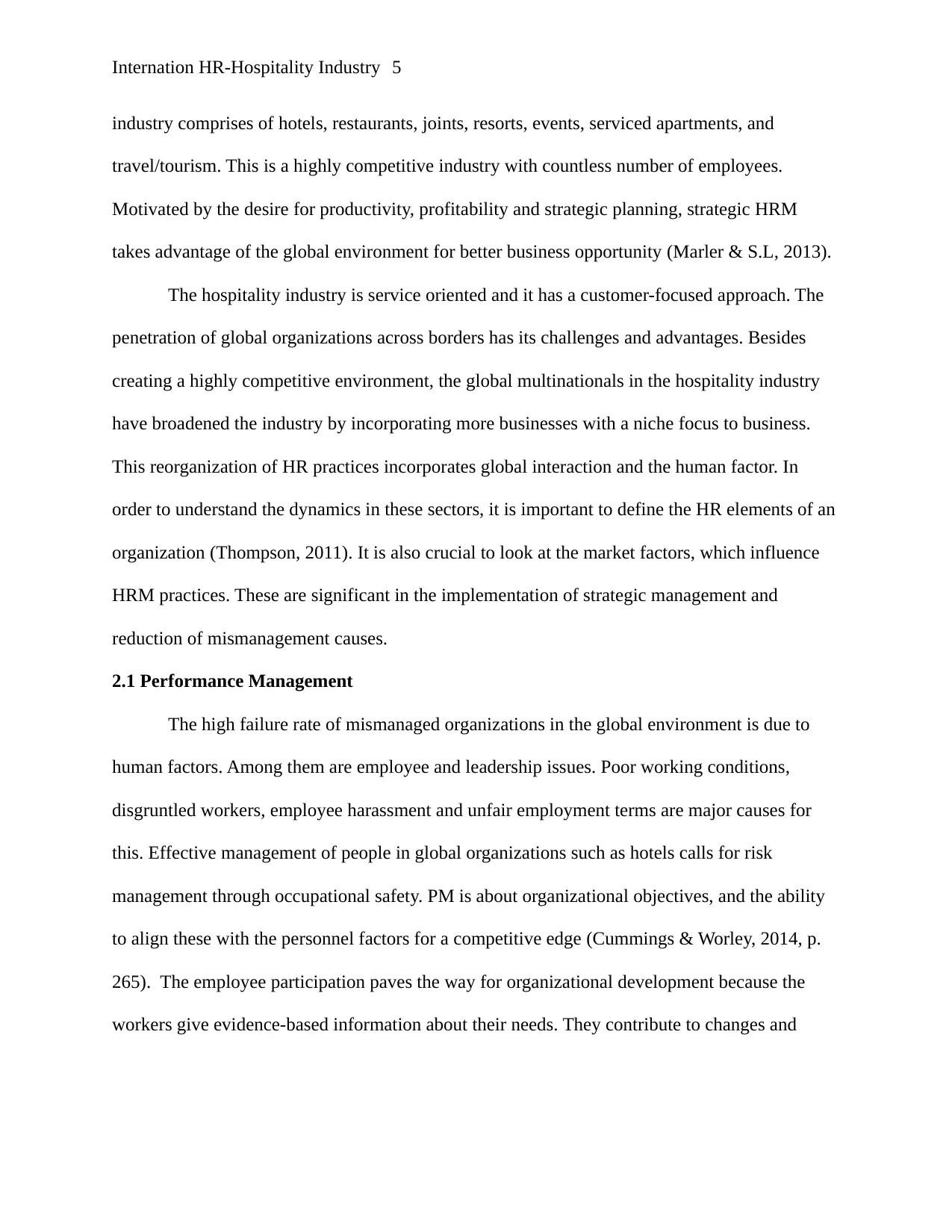
Internation HR-Hospitality Industry 5
industry comprises of hotels, restaurants, joints, resorts, events, serviced apartments, and
travel/tourism. This is a highly competitive industry with countless number of employees.
Motivated by the desire for productivity, profitability and strategic planning, strategic HRM
takes advantage of the global environment for better business opportunity (Marler & S.L, 2013).
The hospitality industry is service oriented and it has a customer-focused approach. The
penetration of global organizations across borders has its challenges and advantages. Besides
creating a highly competitive environment, the global multinationals in the hospitality industry
have broadened the industry by incorporating more businesses with a niche focus to business.
This reorganization of HR practices incorporates global interaction and the human factor. In
order to understand the dynamics in these sectors, it is important to define the HR elements of an
organization (Thompson, 2011). It is also crucial to look at the market factors, which influence
HRM practices. These are significant in the implementation of strategic management and
reduction of mismanagement causes.
2.1 Performance Management
The high failure rate of mismanaged organizations in the global environment is due to
human factors. Among them are employee and leadership issues. Poor working conditions,
disgruntled workers, employee harassment and unfair employment terms are major causes for
this. Effective management of people in global organizations such as hotels calls for risk
management through occupational safety. PM is about organizational objectives, and the ability
to align these with the personnel factors for a competitive edge (Cummings & Worley, 2014, p.
265). The employee participation paves the way for organizational development because the
workers give evidence-based information about their needs. They contribute to changes and
industry comprises of hotels, restaurants, joints, resorts, events, serviced apartments, and
travel/tourism. This is a highly competitive industry with countless number of employees.
Motivated by the desire for productivity, profitability and strategic planning, strategic HRM
takes advantage of the global environment for better business opportunity (Marler & S.L, 2013).
The hospitality industry is service oriented and it has a customer-focused approach. The
penetration of global organizations across borders has its challenges and advantages. Besides
creating a highly competitive environment, the global multinationals in the hospitality industry
have broadened the industry by incorporating more businesses with a niche focus to business.
This reorganization of HR practices incorporates global interaction and the human factor. In
order to understand the dynamics in these sectors, it is important to define the HR elements of an
organization (Thompson, 2011). It is also crucial to look at the market factors, which influence
HRM practices. These are significant in the implementation of strategic management and
reduction of mismanagement causes.
2.1 Performance Management
The high failure rate of mismanaged organizations in the global environment is due to
human factors. Among them are employee and leadership issues. Poor working conditions,
disgruntled workers, employee harassment and unfair employment terms are major causes for
this. Effective management of people in global organizations such as hotels calls for risk
management through occupational safety. PM is about organizational objectives, and the ability
to align these with the personnel factors for a competitive edge (Cummings & Worley, 2014, p.
265). The employee participation paves the way for organizational development because the
workers give evidence-based information about their needs. They contribute to changes and
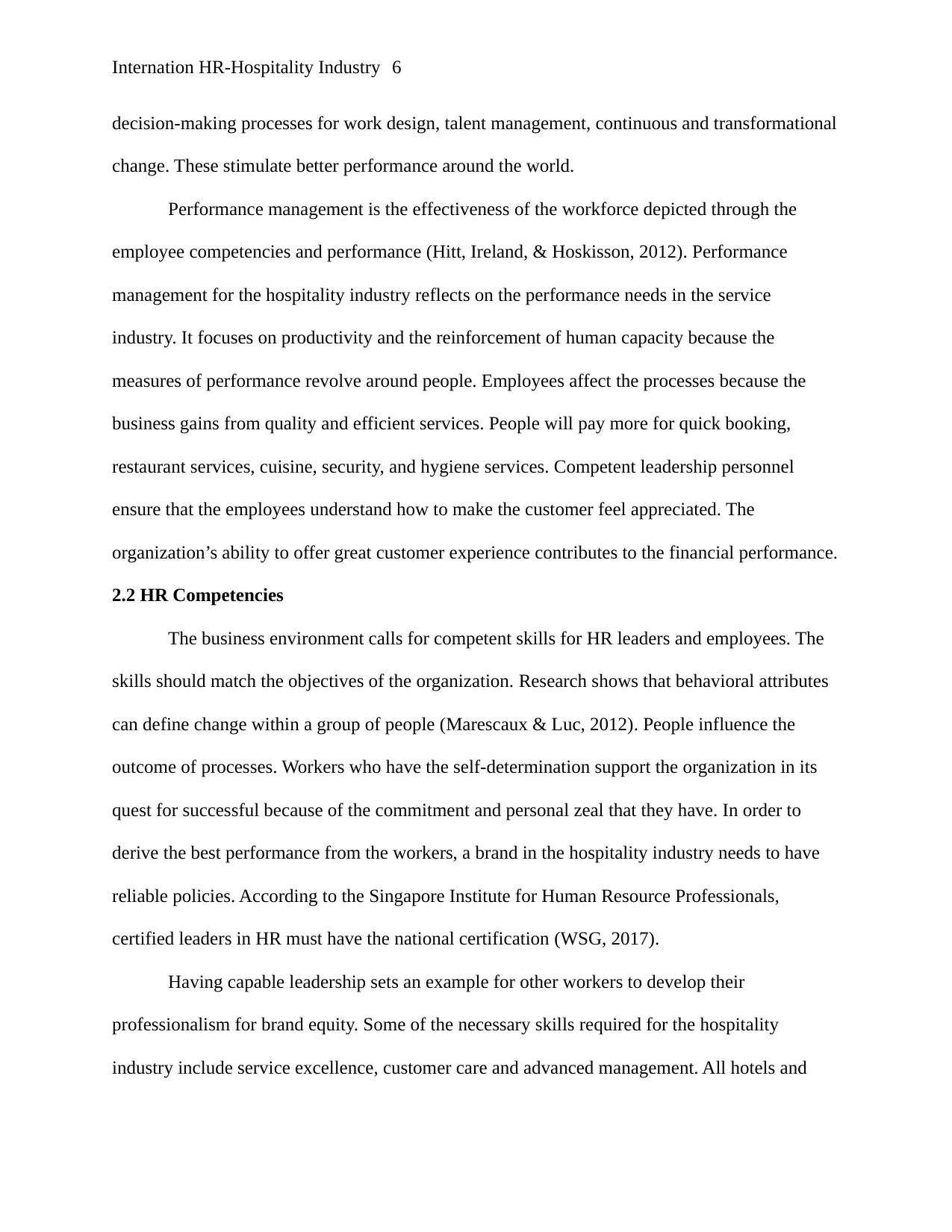
Internation HR-Hospitality Industry 6
decision-making processes for work design, talent management, continuous and transformational
change. These stimulate better performance around the world.
Performance management is the effectiveness of the workforce depicted through the
employee competencies and performance (Hitt, Ireland, & Hoskisson, 2012). Performance
management for the hospitality industry reflects on the performance needs in the service
industry. It focuses on productivity and the reinforcement of human capacity because the
measures of performance revolve around people. Employees affect the processes because the
business gains from quality and efficient services. People will pay more for quick booking,
restaurant services, cuisine, security, and hygiene services. Competent leadership personnel
ensure that the employees understand how to make the customer feel appreciated. The
organization’s ability to offer great customer experience contributes to the financial performance.
2.2 HR Competencies
The business environment calls for competent skills for HR leaders and employees. The
skills should match the objectives of the organization. Research shows that behavioral attributes
can define change within a group of people (Marescaux & Luc, 2012). People influence the
outcome of processes. Workers who have the self-determination support the organization in its
quest for successful because of the commitment and personal zeal that they have. In order to
derive the best performance from the workers, a brand in the hospitality industry needs to have
reliable policies. According to the Singapore Institute for Human Resource Professionals,
certified leaders in HR must have the national certification (WSG, 2017).
Having capable leadership sets an example for other workers to develop their
professionalism for brand equity. Some of the necessary skills required for the hospitality
industry include service excellence, customer care and advanced management. All hotels and
decision-making processes for work design, talent management, continuous and transformational
change. These stimulate better performance around the world.
Performance management is the effectiveness of the workforce depicted through the
employee competencies and performance (Hitt, Ireland, & Hoskisson, 2012). Performance
management for the hospitality industry reflects on the performance needs in the service
industry. It focuses on productivity and the reinforcement of human capacity because the
measures of performance revolve around people. Employees affect the processes because the
business gains from quality and efficient services. People will pay more for quick booking,
restaurant services, cuisine, security, and hygiene services. Competent leadership personnel
ensure that the employees understand how to make the customer feel appreciated. The
organization’s ability to offer great customer experience contributes to the financial performance.
2.2 HR Competencies
The business environment calls for competent skills for HR leaders and employees. The
skills should match the objectives of the organization. Research shows that behavioral attributes
can define change within a group of people (Marescaux & Luc, 2012). People influence the
outcome of processes. Workers who have the self-determination support the organization in its
quest for successful because of the commitment and personal zeal that they have. In order to
derive the best performance from the workers, a brand in the hospitality industry needs to have
reliable policies. According to the Singapore Institute for Human Resource Professionals,
certified leaders in HR must have the national certification (WSG, 2017).
Having capable leadership sets an example for other workers to develop their
professionalism for brand equity. Some of the necessary skills required for the hospitality
industry include service excellence, customer care and advanced management. All hotels and
⊘ This is a preview!⊘
Do you want full access?
Subscribe today to unlock all pages.

Trusted by 1+ million students worldwide
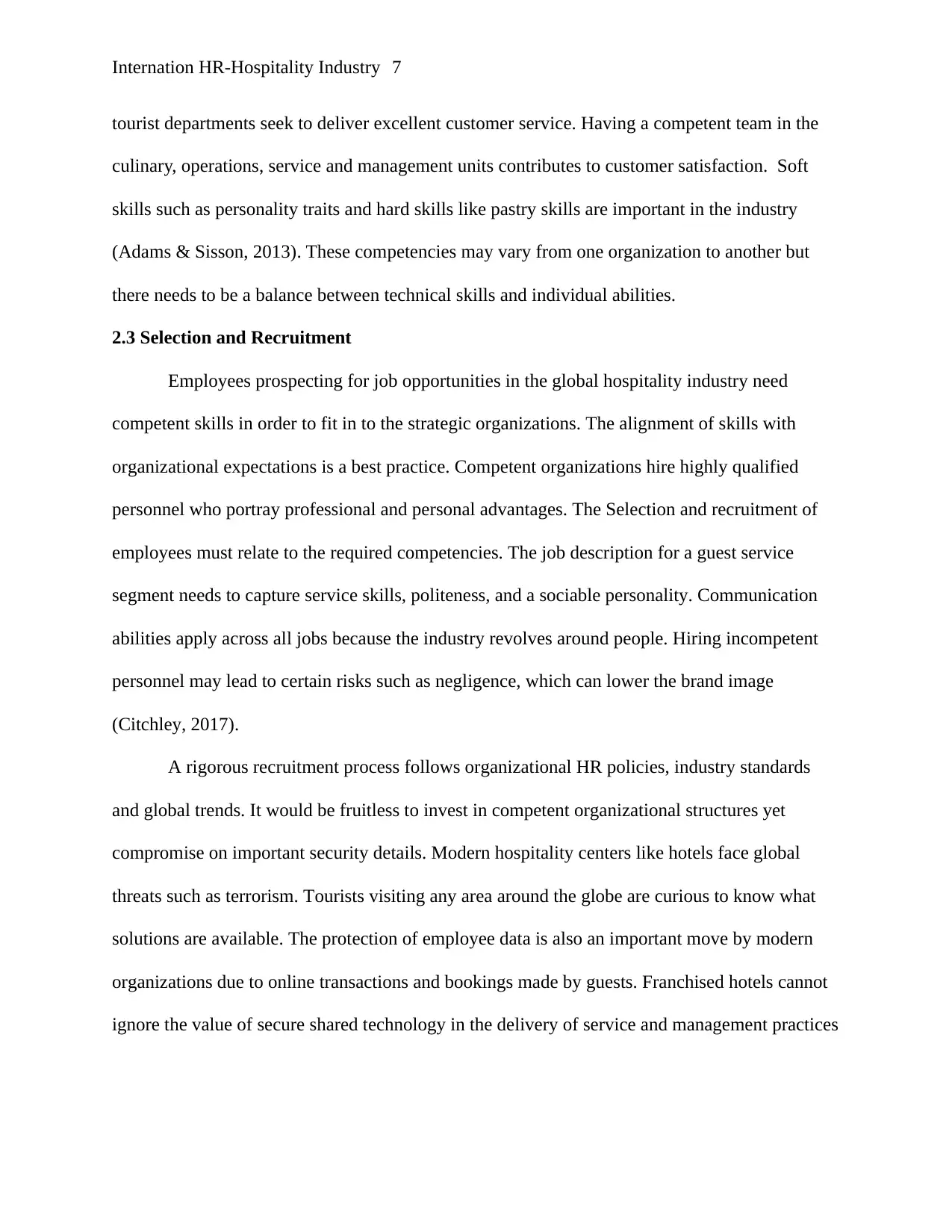
Internation HR-Hospitality Industry 7
tourist departments seek to deliver excellent customer service. Having a competent team in the
culinary, operations, service and management units contributes to customer satisfaction. Soft
skills such as personality traits and hard skills like pastry skills are important in the industry
(Adams & Sisson, 2013). These competencies may vary from one organization to another but
there needs to be a balance between technical skills and individual abilities.
2.3 Selection and Recruitment
Employees prospecting for job opportunities in the global hospitality industry need
competent skills in order to fit in to the strategic organizations. The alignment of skills with
organizational expectations is a best practice. Competent organizations hire highly qualified
personnel who portray professional and personal advantages. The Selection and recruitment of
employees must relate to the required competencies. The job description for a guest service
segment needs to capture service skills, politeness, and a sociable personality. Communication
abilities apply across all jobs because the industry revolves around people. Hiring incompetent
personnel may lead to certain risks such as negligence, which can lower the brand image
(Citchley, 2017).
A rigorous recruitment process follows organizational HR policies, industry standards
and global trends. It would be fruitless to invest in competent organizational structures yet
compromise on important security details. Modern hospitality centers like hotels face global
threats such as terrorism. Tourists visiting any area around the globe are curious to know what
solutions are available. The protection of employee data is also an important move by modern
organizations due to online transactions and bookings made by guests. Franchised hotels cannot
ignore the value of secure shared technology in the delivery of service and management practices
tourist departments seek to deliver excellent customer service. Having a competent team in the
culinary, operations, service and management units contributes to customer satisfaction. Soft
skills such as personality traits and hard skills like pastry skills are important in the industry
(Adams & Sisson, 2013). These competencies may vary from one organization to another but
there needs to be a balance between technical skills and individual abilities.
2.3 Selection and Recruitment
Employees prospecting for job opportunities in the global hospitality industry need
competent skills in order to fit in to the strategic organizations. The alignment of skills with
organizational expectations is a best practice. Competent organizations hire highly qualified
personnel who portray professional and personal advantages. The Selection and recruitment of
employees must relate to the required competencies. The job description for a guest service
segment needs to capture service skills, politeness, and a sociable personality. Communication
abilities apply across all jobs because the industry revolves around people. Hiring incompetent
personnel may lead to certain risks such as negligence, which can lower the brand image
(Citchley, 2017).
A rigorous recruitment process follows organizational HR policies, industry standards
and global trends. It would be fruitless to invest in competent organizational structures yet
compromise on important security details. Modern hospitality centers like hotels face global
threats such as terrorism. Tourists visiting any area around the globe are curious to know what
solutions are available. The protection of employee data is also an important move by modern
organizations due to online transactions and bookings made by guests. Franchised hotels cannot
ignore the value of secure shared technology in the delivery of service and management practices
Paraphrase This Document
Need a fresh take? Get an instant paraphrase of this document with our AI Paraphraser
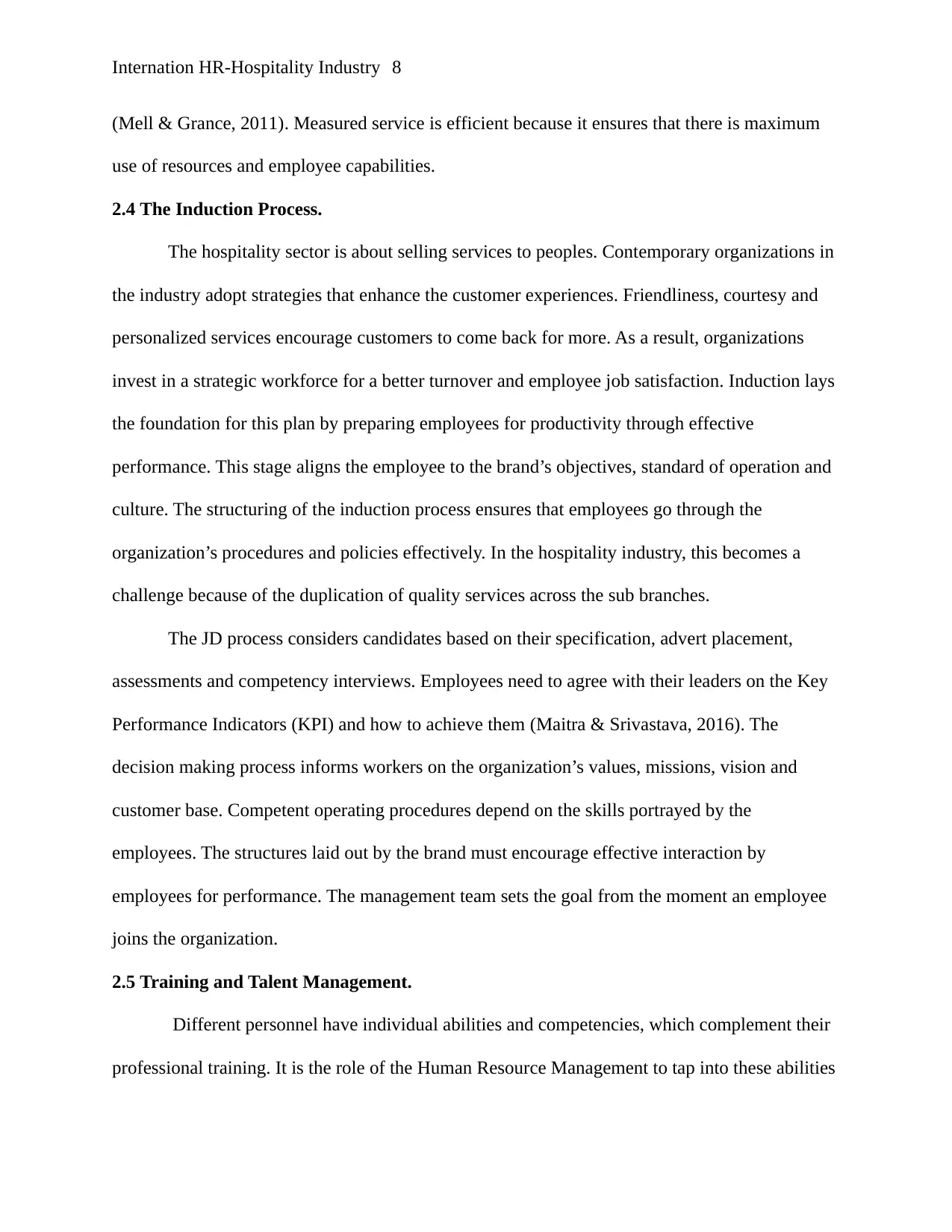
Internation HR-Hospitality Industry 8
(Mell & Grance, 2011). Measured service is efficient because it ensures that there is maximum
use of resources and employee capabilities.
2.4 The Induction Process.
The hospitality sector is about selling services to peoples. Contemporary organizations in
the industry adopt strategies that enhance the customer experiences. Friendliness, courtesy and
personalized services encourage customers to come back for more. As a result, organizations
invest in a strategic workforce for a better turnover and employee job satisfaction. Induction lays
the foundation for this plan by preparing employees for productivity through effective
performance. This stage aligns the employee to the brand’s objectives, standard of operation and
culture. The structuring of the induction process ensures that employees go through the
organization’s procedures and policies effectively. In the hospitality industry, this becomes a
challenge because of the duplication of quality services across the sub branches.
The JD process considers candidates based on their specification, advert placement,
assessments and competency interviews. Employees need to agree with their leaders on the Key
Performance Indicators (KPI) and how to achieve them (Maitra & Srivastava, 2016). The
decision making process informs workers on the organization’s values, missions, vision and
customer base. Competent operating procedures depend on the skills portrayed by the
employees. The structures laid out by the brand must encourage effective interaction by
employees for performance. The management team sets the goal from the moment an employee
joins the organization.
2.5 Training and Talent Management.
Different personnel have individual abilities and competencies, which complement their
professional training. It is the role of the Human Resource Management to tap into these abilities
(Mell & Grance, 2011). Measured service is efficient because it ensures that there is maximum
use of resources and employee capabilities.
2.4 The Induction Process.
The hospitality sector is about selling services to peoples. Contemporary organizations in
the industry adopt strategies that enhance the customer experiences. Friendliness, courtesy and
personalized services encourage customers to come back for more. As a result, organizations
invest in a strategic workforce for a better turnover and employee job satisfaction. Induction lays
the foundation for this plan by preparing employees for productivity through effective
performance. This stage aligns the employee to the brand’s objectives, standard of operation and
culture. The structuring of the induction process ensures that employees go through the
organization’s procedures and policies effectively. In the hospitality industry, this becomes a
challenge because of the duplication of quality services across the sub branches.
The JD process considers candidates based on their specification, advert placement,
assessments and competency interviews. Employees need to agree with their leaders on the Key
Performance Indicators (KPI) and how to achieve them (Maitra & Srivastava, 2016). The
decision making process informs workers on the organization’s values, missions, vision and
customer base. Competent operating procedures depend on the skills portrayed by the
employees. The structures laid out by the brand must encourage effective interaction by
employees for performance. The management team sets the goal from the moment an employee
joins the organization.
2.5 Training and Talent Management.
Different personnel have individual abilities and competencies, which complement their
professional training. It is the role of the Human Resource Management to tap into these abilities
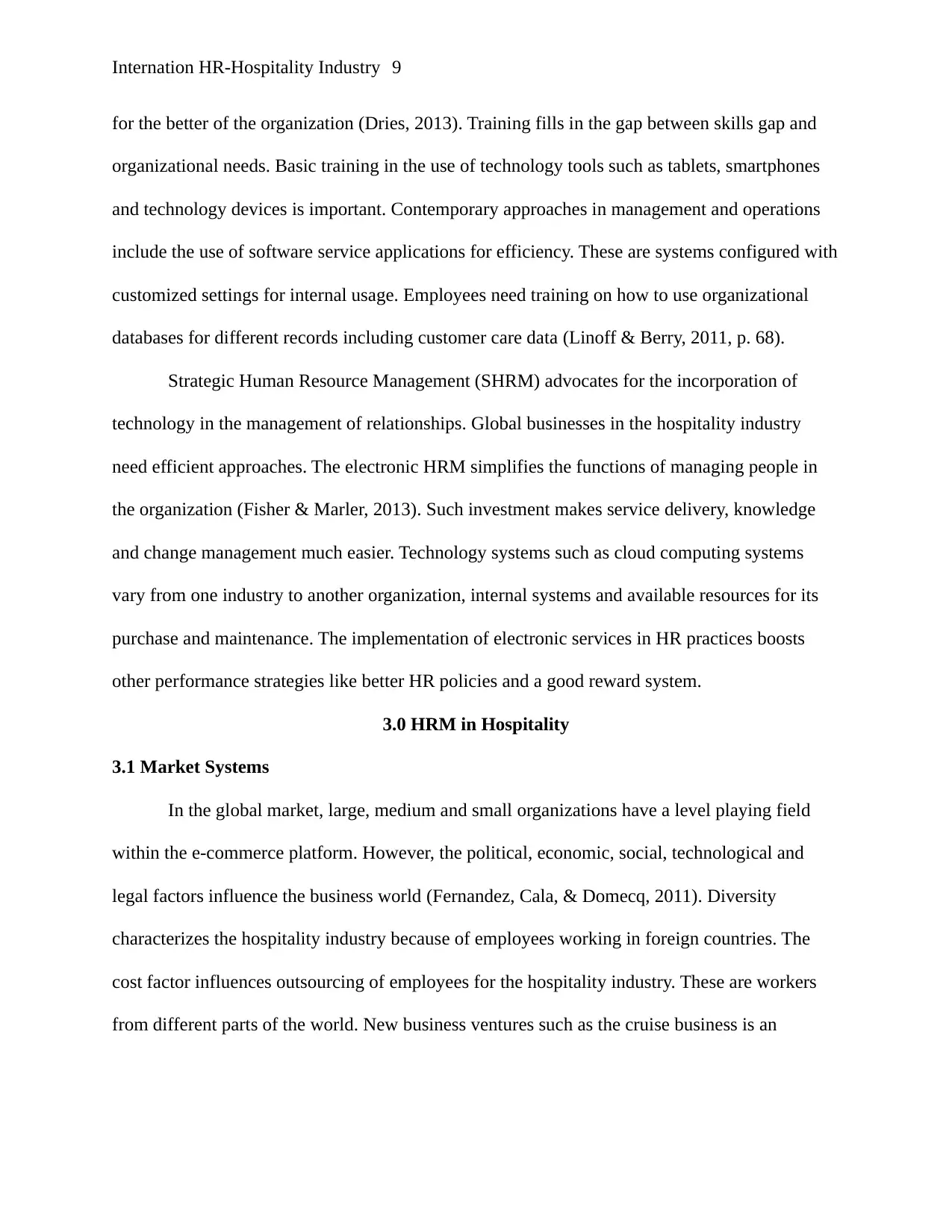
Internation HR-Hospitality Industry 9
for the better of the organization (Dries, 2013). Training fills in the gap between skills gap and
organizational needs. Basic training in the use of technology tools such as tablets, smartphones
and technology devices is important. Contemporary approaches in management and operations
include the use of software service applications for efficiency. These are systems configured with
customized settings for internal usage. Employees need training on how to use organizational
databases for different records including customer care data (Linoff & Berry, 2011, p. 68).
Strategic Human Resource Management (SHRM) advocates for the incorporation of
technology in the management of relationships. Global businesses in the hospitality industry
need efficient approaches. The electronic HRM simplifies the functions of managing people in
the organization (Fisher & Marler, 2013). Such investment makes service delivery, knowledge
and change management much easier. Technology systems such as cloud computing systems
vary from one industry to another organization, internal systems and available resources for its
purchase and maintenance. The implementation of electronic services in HR practices boosts
other performance strategies like better HR policies and a good reward system.
3.0 HRM in Hospitality
3.1 Market Systems
In the global market, large, medium and small organizations have a level playing field
within the e-commerce platform. However, the political, economic, social, technological and
legal factors influence the business world (Fernandez, Cala, & Domecq, 2011). Diversity
characterizes the hospitality industry because of employees working in foreign countries. The
cost factor influences outsourcing of employees for the hospitality industry. These are workers
from different parts of the world. New business ventures such as the cruise business is an
for the better of the organization (Dries, 2013). Training fills in the gap between skills gap and
organizational needs. Basic training in the use of technology tools such as tablets, smartphones
and technology devices is important. Contemporary approaches in management and operations
include the use of software service applications for efficiency. These are systems configured with
customized settings for internal usage. Employees need training on how to use organizational
databases for different records including customer care data (Linoff & Berry, 2011, p. 68).
Strategic Human Resource Management (SHRM) advocates for the incorporation of
technology in the management of relationships. Global businesses in the hospitality industry
need efficient approaches. The electronic HRM simplifies the functions of managing people in
the organization (Fisher & Marler, 2013). Such investment makes service delivery, knowledge
and change management much easier. Technology systems such as cloud computing systems
vary from one industry to another organization, internal systems and available resources for its
purchase and maintenance. The implementation of electronic services in HR practices boosts
other performance strategies like better HR policies and a good reward system.
3.0 HRM in Hospitality
3.1 Market Systems
In the global market, large, medium and small organizations have a level playing field
within the e-commerce platform. However, the political, economic, social, technological and
legal factors influence the business world (Fernandez, Cala, & Domecq, 2011). Diversity
characterizes the hospitality industry because of employees working in foreign countries. The
cost factor influences outsourcing of employees for the hospitality industry. These are workers
from different parts of the world. New business ventures such as the cruise business is an
⊘ This is a preview!⊘
Do you want full access?
Subscribe today to unlock all pages.

Trusted by 1+ million students worldwide
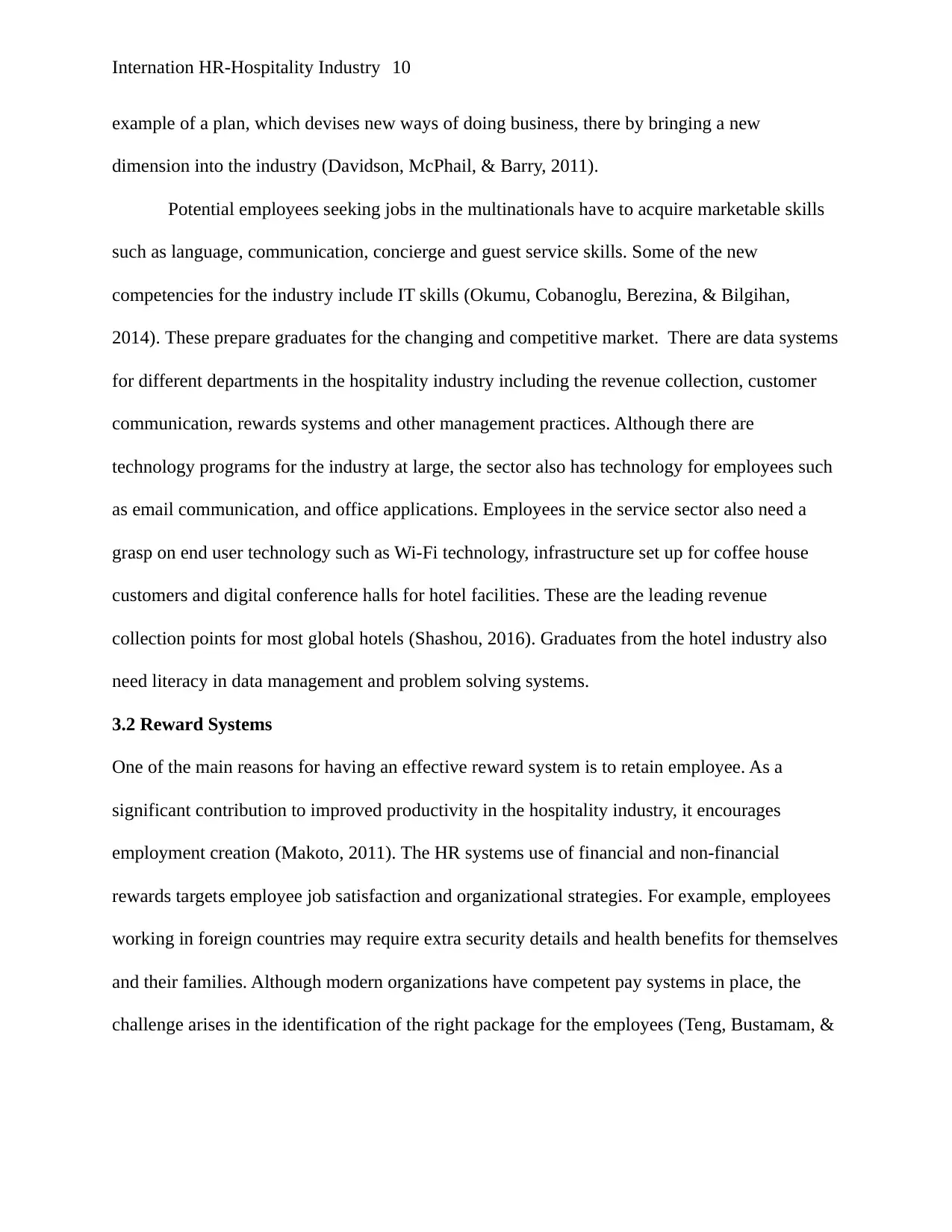
Internation HR-Hospitality Industry 10
example of a plan, which devises new ways of doing business, there by bringing a new
dimension into the industry (Davidson, McPhail, & Barry, 2011).
Potential employees seeking jobs in the multinationals have to acquire marketable skills
such as language, communication, concierge and guest service skills. Some of the new
competencies for the industry include IT skills (Okumu, Cobanoglu, Berezina, & Bilgihan,
2014). These prepare graduates for the changing and competitive market. There are data systems
for different departments in the hospitality industry including the revenue collection, customer
communication, rewards systems and other management practices. Although there are
technology programs for the industry at large, the sector also has technology for employees such
as email communication, and office applications. Employees in the service sector also need a
grasp on end user technology such as Wi-Fi technology, infrastructure set up for coffee house
customers and digital conference halls for hotel facilities. These are the leading revenue
collection points for most global hotels (Shashou, 2016). Graduates from the hotel industry also
need literacy in data management and problem solving systems.
3.2 Reward Systems
One of the main reasons for having an effective reward system is to retain employee. As a
significant contribution to improved productivity in the hospitality industry, it encourages
employment creation (Makoto, 2011). The HR systems use of financial and non-financial
rewards targets employee job satisfaction and organizational strategies. For example, employees
working in foreign countries may require extra security details and health benefits for themselves
and their families. Although modern organizations have competent pay systems in place, the
challenge arises in the identification of the right package for the employees (Teng, Bustamam, &
example of a plan, which devises new ways of doing business, there by bringing a new
dimension into the industry (Davidson, McPhail, & Barry, 2011).
Potential employees seeking jobs in the multinationals have to acquire marketable skills
such as language, communication, concierge and guest service skills. Some of the new
competencies for the industry include IT skills (Okumu, Cobanoglu, Berezina, & Bilgihan,
2014). These prepare graduates for the changing and competitive market. There are data systems
for different departments in the hospitality industry including the revenue collection, customer
communication, rewards systems and other management practices. Although there are
technology programs for the industry at large, the sector also has technology for employees such
as email communication, and office applications. Employees in the service sector also need a
grasp on end user technology such as Wi-Fi technology, infrastructure set up for coffee house
customers and digital conference halls for hotel facilities. These are the leading revenue
collection points for most global hotels (Shashou, 2016). Graduates from the hotel industry also
need literacy in data management and problem solving systems.
3.2 Reward Systems
One of the main reasons for having an effective reward system is to retain employee. As a
significant contribution to improved productivity in the hospitality industry, it encourages
employment creation (Makoto, 2011). The HR systems use of financial and non-financial
rewards targets employee job satisfaction and organizational strategies. For example, employees
working in foreign countries may require extra security details and health benefits for themselves
and their families. Although modern organizations have competent pay systems in place, the
challenge arises in the identification of the right package for the employees (Teng, Bustamam, &
Paraphrase This Document
Need a fresh take? Get an instant paraphrase of this document with our AI Paraphraser
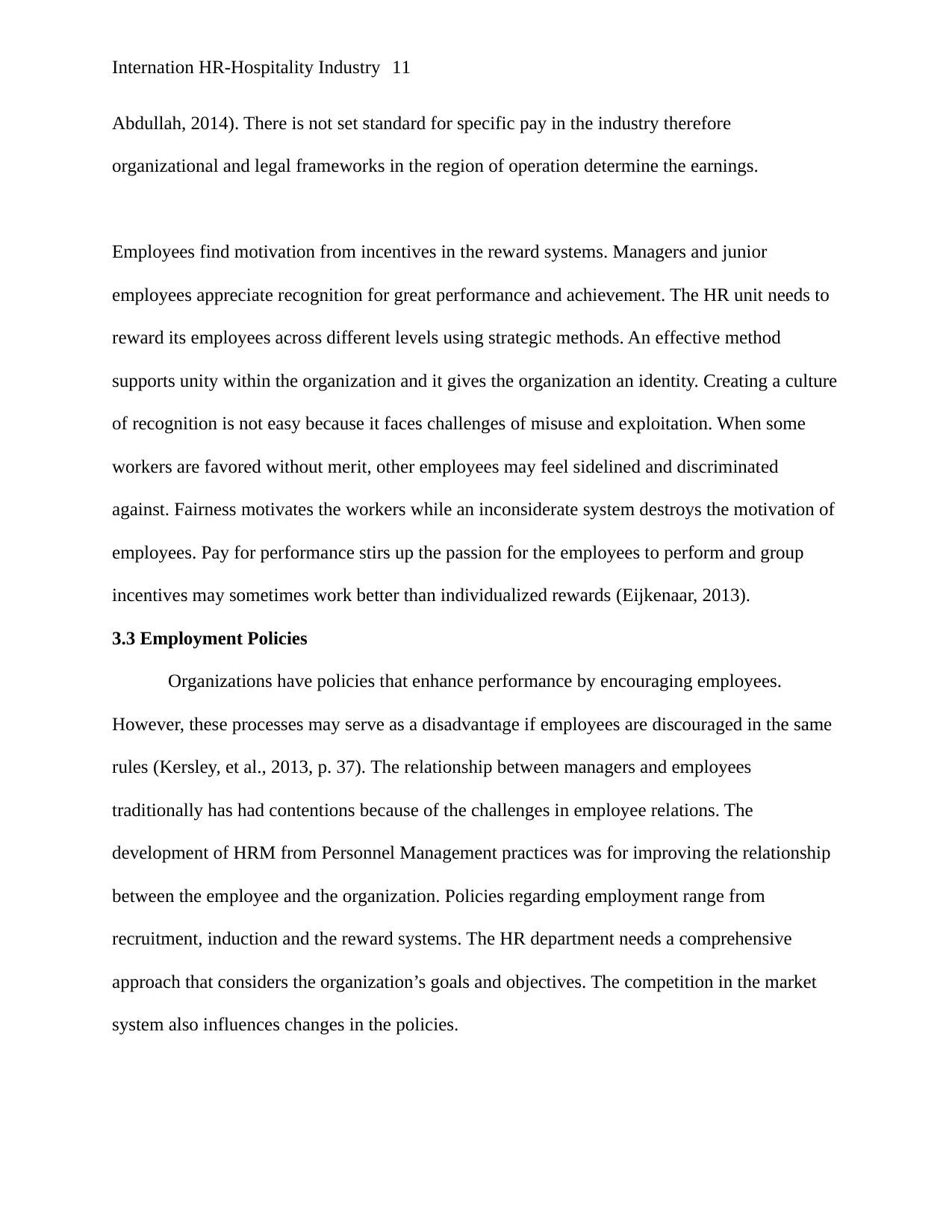
Internation HR-Hospitality Industry 11
Abdullah, 2014). There is not set standard for specific pay in the industry therefore
organizational and legal frameworks in the region of operation determine the earnings.
Employees find motivation from incentives in the reward systems. Managers and junior
employees appreciate recognition for great performance and achievement. The HR unit needs to
reward its employees across different levels using strategic methods. An effective method
supports unity within the organization and it gives the organization an identity. Creating a culture
of recognition is not easy because it faces challenges of misuse and exploitation. When some
workers are favored without merit, other employees may feel sidelined and discriminated
against. Fairness motivates the workers while an inconsiderate system destroys the motivation of
employees. Pay for performance stirs up the passion for the employees to perform and group
incentives may sometimes work better than individualized rewards (Eijkenaar, 2013).
3.3 Employment Policies
Organizations have policies that enhance performance by encouraging employees.
However, these processes may serve as a disadvantage if employees are discouraged in the same
rules (Kersley, et al., 2013, p. 37). The relationship between managers and employees
traditionally has had contentions because of the challenges in employee relations. The
development of HRM from Personnel Management practices was for improving the relationship
between the employee and the organization. Policies regarding employment range from
recruitment, induction and the reward systems. The HR department needs a comprehensive
approach that considers the organization’s goals and objectives. The competition in the market
system also influences changes in the policies.
Abdullah, 2014). There is not set standard for specific pay in the industry therefore
organizational and legal frameworks in the region of operation determine the earnings.
Employees find motivation from incentives in the reward systems. Managers and junior
employees appreciate recognition for great performance and achievement. The HR unit needs to
reward its employees across different levels using strategic methods. An effective method
supports unity within the organization and it gives the organization an identity. Creating a culture
of recognition is not easy because it faces challenges of misuse and exploitation. When some
workers are favored without merit, other employees may feel sidelined and discriminated
against. Fairness motivates the workers while an inconsiderate system destroys the motivation of
employees. Pay for performance stirs up the passion for the employees to perform and group
incentives may sometimes work better than individualized rewards (Eijkenaar, 2013).
3.3 Employment Policies
Organizations have policies that enhance performance by encouraging employees.
However, these processes may serve as a disadvantage if employees are discouraged in the same
rules (Kersley, et al., 2013, p. 37). The relationship between managers and employees
traditionally has had contentions because of the challenges in employee relations. The
development of HRM from Personnel Management practices was for improving the relationship
between the employee and the organization. Policies regarding employment range from
recruitment, induction and the reward systems. The HR department needs a comprehensive
approach that considers the organization’s goals and objectives. The competition in the market
system also influences changes in the policies.
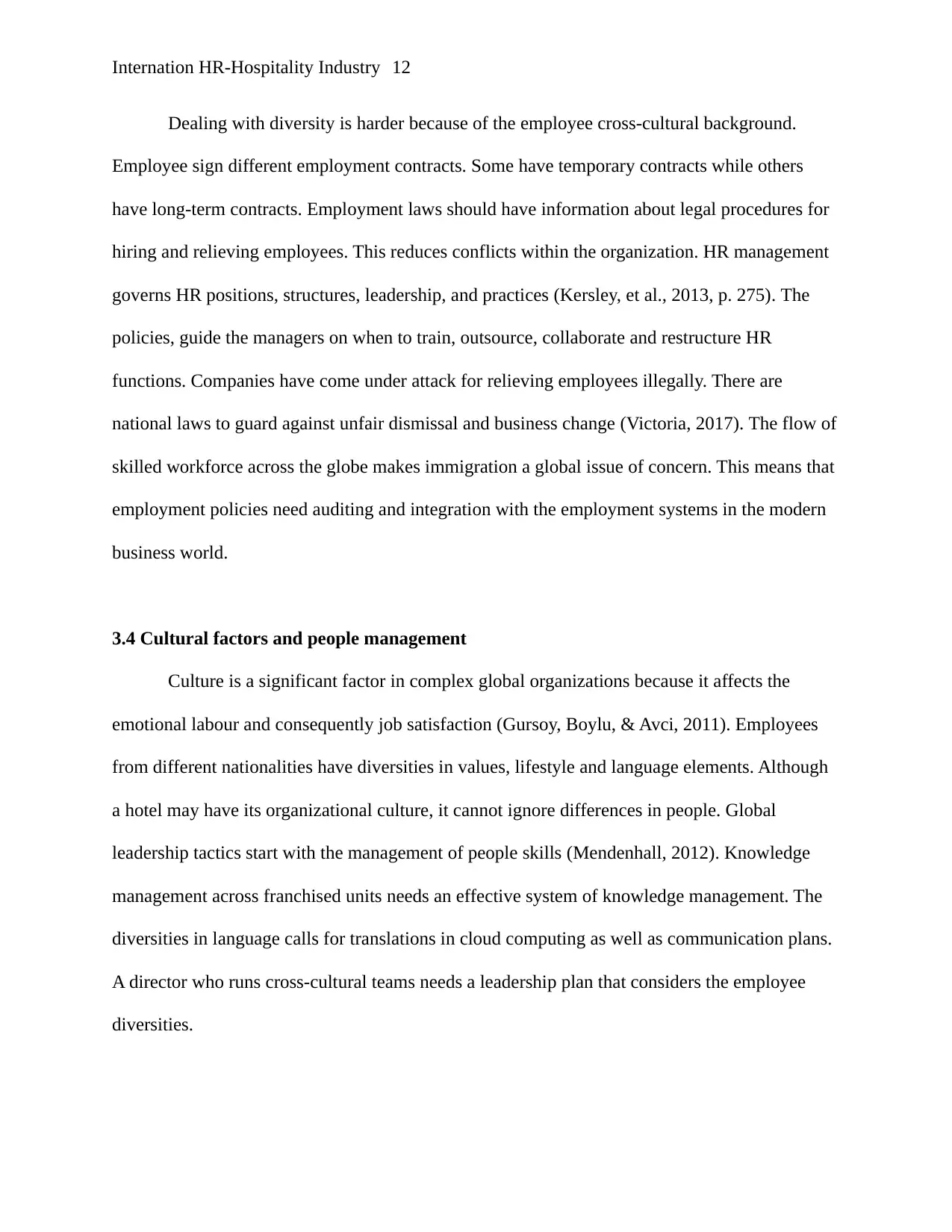
Internation HR-Hospitality Industry 12
Dealing with diversity is harder because of the employee cross-cultural background.
Employee sign different employment contracts. Some have temporary contracts while others
have long-term contracts. Employment laws should have information about legal procedures for
hiring and relieving employees. This reduces conflicts within the organization. HR management
governs HR positions, structures, leadership, and practices (Kersley, et al., 2013, p. 275). The
policies, guide the managers on when to train, outsource, collaborate and restructure HR
functions. Companies have come under attack for relieving employees illegally. There are
national laws to guard against unfair dismissal and business change (Victoria, 2017). The flow of
skilled workforce across the globe makes immigration a global issue of concern. This means that
employment policies need auditing and integration with the employment systems in the modern
business world.
3.4 Cultural factors and people management
Culture is a significant factor in complex global organizations because it affects the
emotional labour and consequently job satisfaction (Gursoy, Boylu, & Avci, 2011). Employees
from different nationalities have diversities in values, lifestyle and language elements. Although
a hotel may have its organizational culture, it cannot ignore differences in people. Global
leadership tactics start with the management of people skills (Mendenhall, 2012). Knowledge
management across franchised units needs an effective system of knowledge management. The
diversities in language calls for translations in cloud computing as well as communication plans.
A director who runs cross-cultural teams needs a leadership plan that considers the employee
diversities.
Dealing with diversity is harder because of the employee cross-cultural background.
Employee sign different employment contracts. Some have temporary contracts while others
have long-term contracts. Employment laws should have information about legal procedures for
hiring and relieving employees. This reduces conflicts within the organization. HR management
governs HR positions, structures, leadership, and practices (Kersley, et al., 2013, p. 275). The
policies, guide the managers on when to train, outsource, collaborate and restructure HR
functions. Companies have come under attack for relieving employees illegally. There are
national laws to guard against unfair dismissal and business change (Victoria, 2017). The flow of
skilled workforce across the globe makes immigration a global issue of concern. This means that
employment policies need auditing and integration with the employment systems in the modern
business world.
3.4 Cultural factors and people management
Culture is a significant factor in complex global organizations because it affects the
emotional labour and consequently job satisfaction (Gursoy, Boylu, & Avci, 2011). Employees
from different nationalities have diversities in values, lifestyle and language elements. Although
a hotel may have its organizational culture, it cannot ignore differences in people. Global
leadership tactics start with the management of people skills (Mendenhall, 2012). Knowledge
management across franchised units needs an effective system of knowledge management. The
diversities in language calls for translations in cloud computing as well as communication plans.
A director who runs cross-cultural teams needs a leadership plan that considers the employee
diversities.
⊘ This is a preview!⊘
Do you want full access?
Subscribe today to unlock all pages.

Trusted by 1+ million students worldwide
1 out of 19
Related Documents
Your All-in-One AI-Powered Toolkit for Academic Success.
+13062052269
info@desklib.com
Available 24*7 on WhatsApp / Email
![[object Object]](/_next/static/media/star-bottom.7253800d.svg)
Unlock your academic potential
Copyright © 2020–2026 A2Z Services. All Rights Reserved. Developed and managed by ZUCOL.





